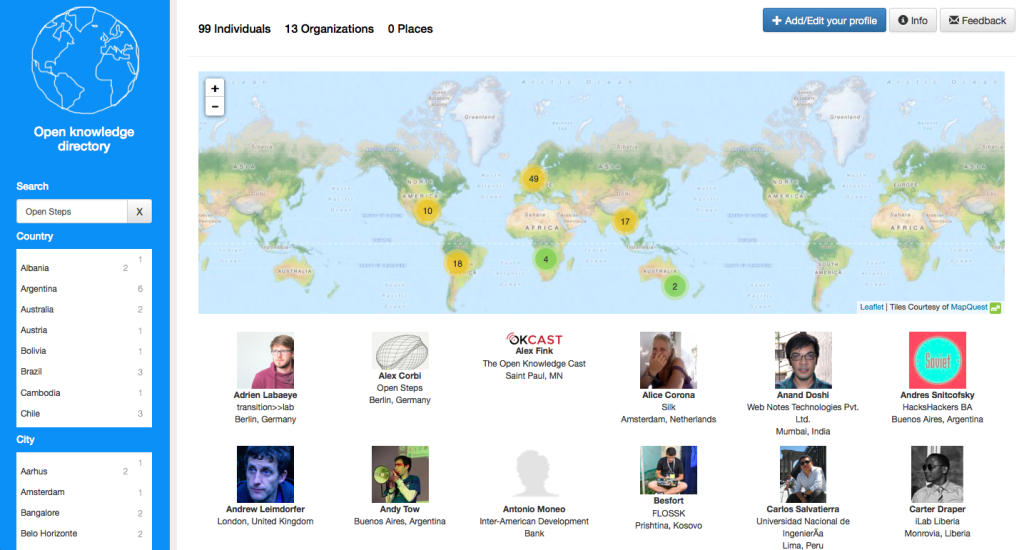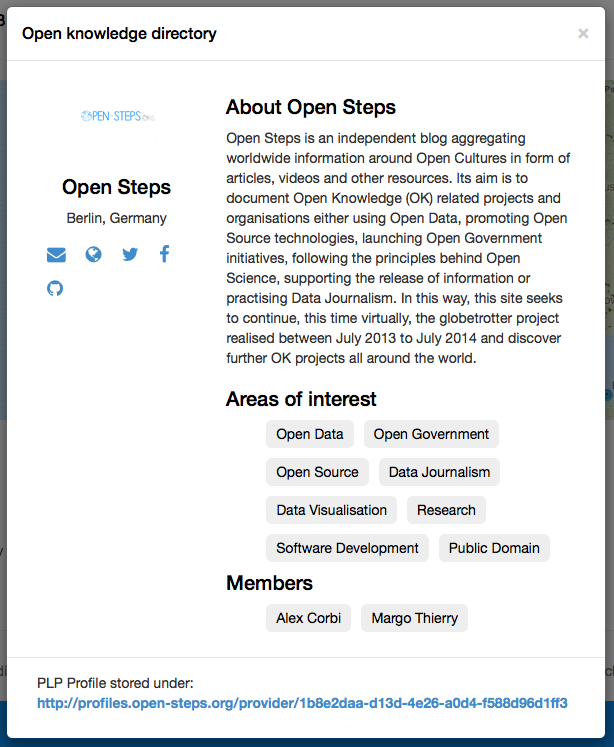This is a guest blog post from Open Steps, an independent blog aggregating worldwide information around Open Cultures in form of articles, videos and other resources. Its aim is to document open knowledge (OK) related projects and keep track on the status of such initiatives worldwide. From organisations using Open Data, promoting Open Source technologies, launching Open Government initiatives, following the principles behind Open Science, supporting the release of information to newsrooms practicing Data Journalism.
In this way, their site seeks to continue, this time virtually, the globetrotter project realised between July 2013 to July 2014 and discover further OK projects all around the world.
If you followed the journey across Europe, India, Asia and South-America that Margo and Alex from Open Steps undertook last year, you probably already know their open knowledge directory. During those 12 months, in every of the 24 visited countries they had the chance to met numerous enthusiastic activists sharing the same ideas and approaches. In order to keep record of all those amazing projects they created what began as a simple contact list but soon evolved in a web application that has been growing since then.
After some iterations a new version has been recently released which not only features a new user interface with better usability but also sets a base for a continuous development that aims to encourage collaboration among people across borders while monitoring the status of open knowledge initiatives worldwide and raising awareness about relevant projects worth to discover. If you haven’t done it yet, head to http://directory.open-steps.org and join it!
New version implementing PLP Profiles
One of the main features of this new version is the implementation of the Portable Linked Profiles, short PLP. In a nutshell, PLP allows you to create a profile with your basic contact information that you can use, re-use and share. Basic contact information refers to the kind of information you are used to type in dozens of online forms, from registering on social networks, accessing web services or leaving your feedback in forums, it is always the same information: Name, Email, Address, Website, Facebook, Twitter, etc…PLP addresses this issue but also, and most important, allows you to decide where you want your data to be stored.
By implementing PLP, this directory does not make use anymore of the old Google Form and now allow users to edit their data and keep it up-to-date easily. For the sake of re-usability and interoperability, it makes listing your profile in another directory so easy as just pasting the URI of your profile on it. If you want to know more about PLP, kindly head to the current home page, read a more extensive article about it on Open Steps or check the github repository with the documentation. PLP is Open Source software and is based on Open Web Standards and Common Vocabularies so collaboration is more than welcome.
Participate on defining the next steps for the open knowledge directory
Speaking about collaboration, on the upcoming Wednesday 12th of November, a discussion will take place on how the worldwide open knowledge community can benefit from such a directory, how the current Open Steps’ implementation can be improved and what would be the next steps to follow. No matter what background you have, if you are a member of the worldwide open knowledge community and want to participate on the improvement of the open knowledge directory, please join us.
When? Wednesday, 12th November 2014. 3pm GMT
Event on Google+: https://plus.google.com/events/c46ni4h7mc9ao6b48d9sflnetvo
References
- Documentation: On Github and Google docs
- Discussion: On Trello
This blog post is also available on the Open Education Working Group blog.
This post is by a guest poster. If you would like to write something for the Open Knowledge Foundation blog, please see the submissions page.











